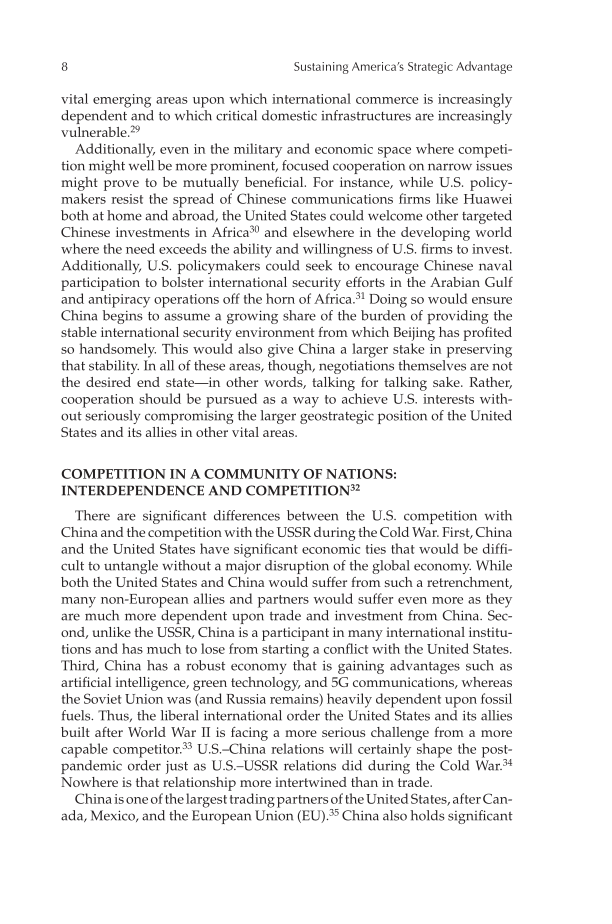8 Sustaining America’s Strategic Advantage vital emerging areas upon which international commerce is increasingly dependent and to which critical domestic infrastructures are increasingly vulnerable.29 Additionally, even in the military and economic space where competi- tion might well be more prominent, focused cooperation on narrow issues might prove to be mutually beneficial. For instance, while U.S. policy- makers resist the spread of Chinese communications firms like Huawei both at home and abroad, the United States could welcome other targeted Chinese investments in Africa30 and elsewhere in the developing world where the need exceeds the ability and willingness of U.S. firms to invest. Additionally, U.S. policymakers could seek to encourage Chinese naval participation to bolster international security efforts in the Arabian Gulf and antipiracy operations off the horn of Africa.31 Doing so would ensure China begins to assume a growing share of the burden of providing the stable international security environment from which Beijing has profited so handsomely. This would also give China a larger stake in preserving that stability. In all of these areas, though, negotiations themselves are not the desired end state—in other words, talking for talking sake. Rather, cooperation should be pursued as a way to achieve U.S. interests with- out seriously compromising the larger geostrategic position of the United States and its allies in other vital areas. COMPETITION IN A COMMUNITY OF NATIONS: INTERDEPENDENCE AND COMPETITION32 There are significant differences between the U.S. competition with China and the competition with the USSR during the Cold War. First, China and the United States have significant economic ties that would be diffi- cult to untangle without a major disruption of the global economy. While both the United States and China would suffer from such a retrenchment, many non-European allies and partners would suffer even more as they are much more dependent upon trade and investment from China. Sec- ond, unlike the USSR, China is a participant in many international institu- tions and has much to lose from starting a conflict with the United States. Third, China has a robust economy that is gaining advantages such as artificial intelligence, green technology, and 5G communications, whereas the Soviet Union was (and Russia remains) heavily dependent upon fossil fuels. Thus, the liberal international order the United States and its allies built after World War II is facing a more serious challenge from a more capable competitor.33 U.S.–China relations will certainly shape the post- pandemic order just as U.S.–USSR relations did during the Cold War.34 Nowhere is that relationship more intertwined than in trade. China is one of the largest trading partners of the United States, after Can- ada, Mexico, and the European Union (EU).35 China also holds significant
Document Details My Account Print multiple pages
Print
You have printed 0 times in the last 24 hours.
Your print count will reset on at .
You may print 0 more time(s) before then.
You may print a maximum of 0 pages at a time.











































































































































































































































































































































































